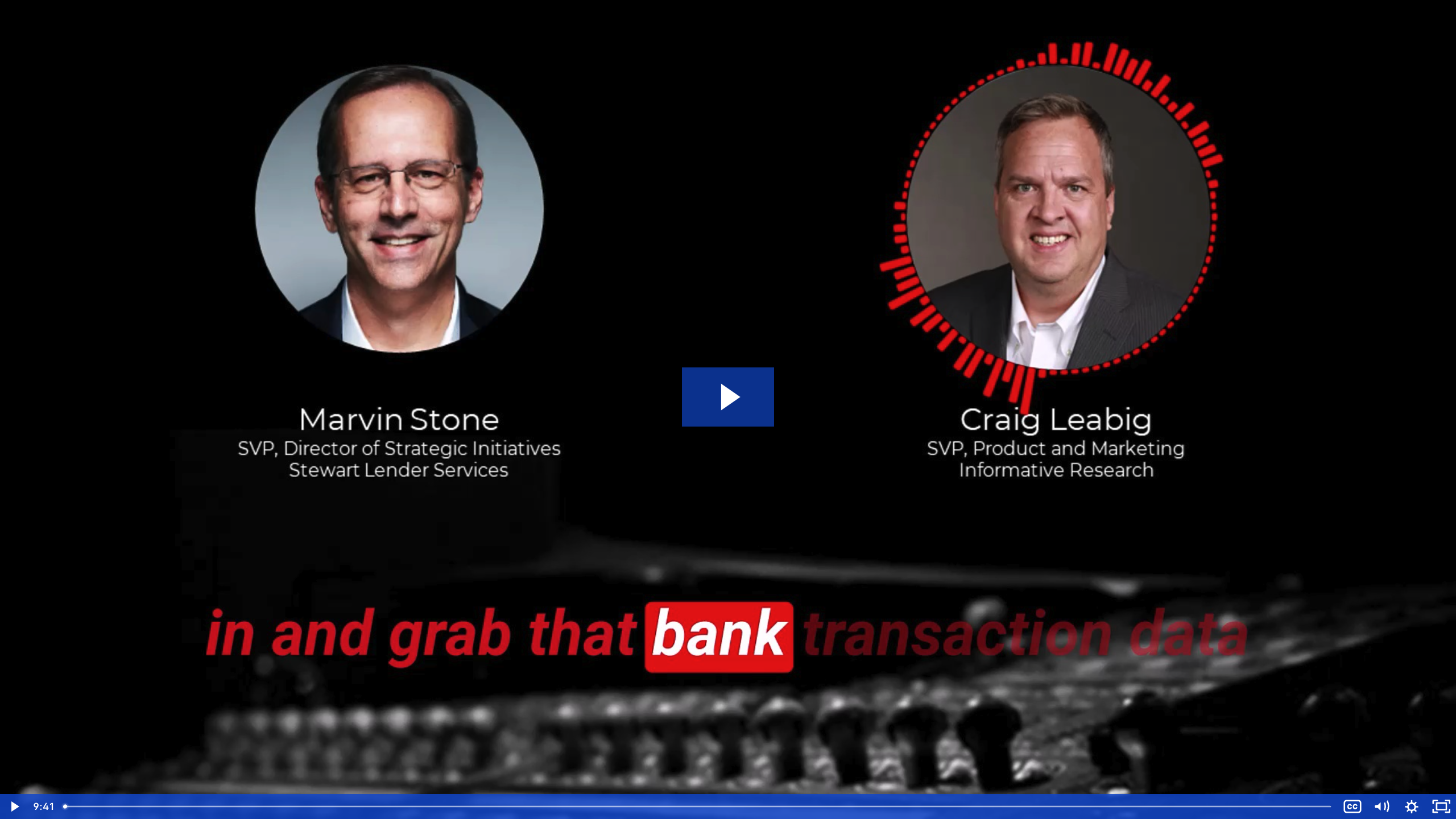Stewart in the Studio
Validate Income Employment and Assets Using A Single VOA Report
Stewart in the Studio, hosted by Marvin Stone, SVP, Strategic Initiatives, is a fast-paced monthly podcast focused on issues vital to the mortgage lending industry. Tune in each month as Marvin and industry thought leaders discuss important trends and timely topics.
To speak to a Stewart Lender Services expert, please fill out the form to the right – we will get back to you shortly.

Stewart in the Studio Form

Episode Notes
- Guest speaker: Craig Leabig, SVP of Marketing and Product at Informative Research.
- Craig sheds light on the latest groundbreaking GSE announcement, effective March 29th, 2024, allowing lenders to leverage digital banking data to verify income and employment through Desktop Underwriter.
- Discover the challenges lenders face in verification processes and how this announcement aims to streamline operations, improve quality and reduce costs.
- Craig explains how Informative Research, with its AccountChek and Verifications platforms, is uniquely positioned to assist lenders in performing verifications.
Speaker Bios
Speakers for this episode include:

Marvin Stone
As Senior Vice President, Director of Strategic Initiatives for Stewart Lender Services, Marvin Stone is working on the digital transformation of the transaction process for Stewart’s full range of services that cover the entire mortgage lifecycle. He also contributes to industry technology by participating in MBA’s MISMO Title and Settlement Community of Practice and being part of Stewart’s generative AI council.
Stone has been with Stewart since 2007 and has managed various technology, process and compliance initiatives for the direct, agency and centralized title divisions. Before joining Stewart, he was CIO for a large title company on the West Coast and held strategic roles with other national underwriters and mortgage lenders.
Stone is a frequent speaker at industry events and is sought out for his commentary on industry trends.

Episode 8 Transcript
View Full Transcript
E8: Validate Income Employment and Assets Using A Single VOA Report
Marvin Stone: Welcome to the show, everyone. Today, our guest is Craig Leabig, Senior Vice President of Marketing and Product at Informative Research. Craig, with your years of experience and deep expertise in the mortgage verification space, what’s your take on the recent announcements about single source validation?
Craig Leabig: Hey, Marvin, thanks for having me. I appreciate the opportunity to join you today. We are very excited about what was announced. I’ll give you my take on it, but let me give you in the audience, just a little bit of background on what was announced. Fannie Mae was who made the announcement and they said that effective March 29th, 2024, that lenders who use Desktop Underwriter will be able to leverage asset data to verify income and employment.
And when they do that, and DU is able to validate that income and employment using that digital banking data, that the lender might also be able to get rep and warrant relief on that work. That’s pretty big news for the industry because it brings parity to both the GSEs. Freddie Mac has had this program in place for some time now, and Fannie Mae had been in pilot for this since 2018.
So there were differences in the approach that the GSEs had for this type of usage of data. And now that both are on the same page and they’re working together. The GSEs are similar in the way that they allow banking data to be used. We think that it’s going to increase the adoption of this form of data usage for validation in the industry.
It’s going to be a benefit for lenders because typically. These approaches are a bit more economical than some of the other alternatives that are out there, as well as getting the rep and warrant relief. That’s a big deal for lenders as well.
Marvin Stone: Okay, great. So can you shed some light on the pain points lenders encounter with verifications today?
That this announcement actually addresses.
Craig Leabig: Certainly Marvin, I can talk a little bit about the challenges that lenders are facing when it comes to validating income and employment on a mortgage application. So the main themes that we hear from lenders are number one, operational process. There are a number of different vendors that provide this service and there are multiple ways that validation is complete.
And I guess the point is there’s really not one single silver bullet. That means lenders have to cobble together solutions from multiple providers in order to get the verification done. The operational problem with that, when you have multiple service providers and multiple verification types is one, how do you orchestrate the ordering of the verification?
What type of verification do you order? And at what stage of the loan process do you order the verification? How do you. Train your team on how to order and read reports that have different ordering processes and the reports all come in different formats. So not only that, but how do you train the consumer?
There are a number of operational problems that lenders have. The second. Major challenge that we hear from lenders is related to quality and quality really being around the risk of repurchase. That’s something that lenders are very concerned about. And the announcement that Fannie made today added another method by which lenders can get some certainty in their loan manufacturing process, which is a really good thing.
The third concern that lenders have is related to cost. And in this space, the lenders have been subject to a fairly significant price increases from some of the third party data providers over the last few years. And it’s definitely top of mind for lenders to find ways to validate income and employment at a lower cost structure.
Those are the primary problems that lenders have expressed to us as we talk to them.
Marvin Stone: Informative Research is a major player in the verification space, having integrated the AccountChek platform. How is Informative Research uniquely positioned to help lenders and vendors with their verification needs?
Craig Leabig: We’re very focused on improving the verification space from a solutions perspective. AccountChek is the product that we offer to lenders that helps facilitate the retrieval of that bank transaction data from the consumer’s bank. We deliver that to the lender and we also enable an integration with Fannie Mae and Freddie Mac.
So that when the lender is ready to run their decision engine, that AUSs are available to dip in and grab that bank transaction data to inform the GSEs, whether or not they can validate that employment and income using that bank data. So that’s the solution that we recommend. The good news for lenders is those that are using AccountChek today.
They don’t have to make a change in the product in any way we’ve already set up the pipe and have the process set up so that when a lenders opt into the Fannie program, it will automatically work. One thing we want to make clear to our lender clients is that the guidelines of Fannie’s program do not require any change in the type of report from AccountChek that you order from us.
So you’re good to go. You there’s no need to make any changes. It’s all set. So we’ve done that advanced planning and that’s a burden off the lender for making any changes to take advantage of the program from a platform perspective, from a verification side, the three issues that we mentioned before, which were operational.
Cost and quality, we have a strategy in place where we’re looking at all the different verification types and sources, whether it’s from a bureau data set, like the work number or experience verify, or from a consumer permission bank data, like through AccountChek or even a manual verification, there are multiple verification types.
And they all differ in the level of engagement required from the consumer as well as cost. So we’ve created a platform that allows a lender to configure specific lender strategies in terms of acquiring that verification. And the platform executes those orders and orchestrates going out to the respective service providers, gathering the information and bringing that information back.
In a consistent reporting format and delivering that information to the lenders LOS or POS. So from a platform perspective, that platform allows lenders to help manage unnecessary orders to keep those from happening. It helps them to provision users and train them on one way to order and one way to read the reports.
And we’ve done all the integration work with these providers so that the lender doesn’t have to create multiple integrations with multiple providers. So, there’s some significant benefits from a cost perspective, from an operational process perspective. And we have the report providers that provide a high level of quality.
And even in some cases, rep and warrant relief for the verifications that go through the platform. So to sum it up, our products and our platform are configurable and allow the lender to take advantage of the work that we’ve done to build all of those efficiencies.
Marvin Stone: Well, Craig, thank you for sharing your insights for our listeners who are decision makers in the mortgage industry.
Where can they go to learn more about Fannie Mae’s recent announcement and how they might take advantage of single source validation?
Craig Leabig: Thanks, Marvin. I enjoyed it. Yeah. The best way to learn more or to get in touch with us is to go to our website. It’s informative research. com. And if you click the news and education button at the top of the page, you’ll be brought to our blog and you’ll want to search for the blog titled unlocking the power of bank transaction data.
And inside that blog post, it’ll give you some information in terms of how the program works. And you’ll also be able to reach out to us to schedule a free consultation. And our folks can take you a click or two deeper into how it works. So we look forward to connecting with anybody who needs help with this. Thanks again. Take care.
Ready to get started with our team of experts?
Get in touch with us today to speak to one of our real estate valuation experts and learn how SVI can help your organization succeed.



